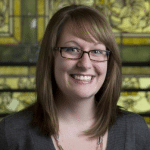Blended Learning and Competency-Based Education Collide in Colorado
CompetencyWorks Blog
 The Donnell-Kay Foundation (DKF), Colorado Department of Education (CDE), and the Colorado Legacy Foundation (CLF) recently hosted a three-part blended learning series. Each part highlighted one component of blended learning: best practices and barriers to implementation, professional development and collaboration, and national policy and next steps for Colorado.
The Donnell-Kay Foundation (DKF), Colorado Department of Education (CDE), and the Colorado Legacy Foundation (CLF) recently hosted a three-part blended learning series. Each part highlighted one component of blended learning: best practices and barriers to implementation, professional development and collaboration, and national policy and next steps for Colorado.
The third session had direct discussions surrounding competency-based education with speakers Utah State Senator Howard Stephenson, and New Hampshire Deputy Commissioner Paul Leather both presenting the progress in their respective states. You can watch the archived webinars and access presentation materials at the Donnell-Kay Foundation’s website.
It may have been a series on blended learning, but it was clear that a competency-based education system is a goal for Colorado. Educators and policymakers are talking about moving Colorado education toward mastery learning to increase student achievement. Amy Anderson, Associate Commissioner of Innovation, Choice and Engagement at CDE, said that the focus is now on dramatically personalized learning for each child.
Paul Leather noted that while New Hampshire has been working on competency-based education for over a decade, the time is now ripe for other states to begin implementing. He attributes this to the Common Core State Standards as well as proliferation of blended and online learning models. This is the angle that Colorado will likely approach competency-based education.
In 2008, “Colorado’s Achievement Plan for Kids” or CAP4K passed through legislature. This bill increased promotion of the alignment from preschool through post-secondary education, and favored competency over seat time. While this bill enabled a shift to competency-based education in Colorado, we are dealing with several common barriers including funding, accountability, and assessments.
The recent legislation session did see a few successful education bills including the call for a statewide digital learning study. Commissioned by CDE, this study will look at how online systems are constructed, which schools are making headway to improve achievement, which students are choosing online programs and why, as well as collecting best practices. Tony Lewis, Executive Director at Donnell-Kay, explained that in Colorado we often see programming lead policy. The Digital Learning Study will provide those best practices as well as what policy is needed to remove current barriers. Strong proof-points in blended and online learning should translate well to components of competency-based education.
Additionally, Colorado will join one of the two assessment consortia aligned with the Common Core Standards. While Colorado has not decided which to join, this partnership may provide further opportunity to advance competency-based education as states implement common core standards.
With recent changes to educator effectiveness rules, we still need to determine how to unbundle student achievement. Focus has been placed on funding and some groups are hopeful we can shift to fractional funding that follows the student and is no longer based on a single count-day system.
We’re not there yet; but the discussion is energetic, the work is happening on the ground in our classrooms, and policymakers are taking notice.
Shelby Edwards is a graduate student in the School of Public Affairs at the University of Colorado-Denver. Serving as the 2011-2012 Education Research Fellow with the Donnell-Kay Foundation, her research focuses on multiple pathways, blended learning, and competency-based education.